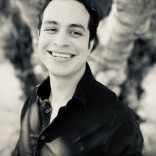How to Say Tomatoes
Ellen Skirvin
Dad and I walked to Uncle Sal’s house on the Fourth of July to watch the parade from his front yard. He lived on the other side of Meadowbrook Elementary, but we only saw him on important holidays, and Fourth of July was the most important of all in our town. People came from all over, even the city, to see the parade on Main Street and fireworks at the high school. They dragged coolers and strollers in the late-morning heat. I pretended it was the apocalypse and the whole town was marching toward safety before the aliens got us.
“Let’s go, Pearl,” Dad said, waiting a block ahead of me. He looked clean and strange in his pink shirt. He said it wasn’t pink but salmon colored. I asked him if that meant white was tilapia colored, but he said of course not.
Dad and I had dyed old T-shirts red and blue that week, because that’s what Mom used to do, but Dad didn’t get the expensive dye or wash the shirts right, so they came out brown and splotchy. Though he didn’t wear his tie-dye shirt, I wore mine because brown was my favorite color and Mom had said it was all the colors mixed in one, which meant that every color was my favorite. I had used a T-shirt that the exterminator gave us for free. It had a big roach on the front.
My red hair fell in knots around my shoulders, and I pulled away thick strands that latched to my neck. Dad had forgotten that Mom would yank my hair back into braids on hot days, or maybe he did remember but didn’t know how to do it. Though Mom’s tight braids gave me a headache, I liked when she unraveled them at the end of the day while I drank cold juice and ate peanut butter crackers. Mom had red hair too and complained it was not as thick as mine. She always folded and clipped hers on top of her head, and I hardly ever saw it released down her back. I only saw glimpses of its full length when she took a shower after gardening. She’d always crack the bathroom door to let out steam. I would slip inside and sit on the toilet. The hot bathroom smelled like vinegar. When she stepped out of the shower, her long wet hair would swing down to her hips. It was ruby red with gold streaks. She wrapped it in a towel before covering her body, as if her hair was more shameful than anything else. Then she would smile at me as she slipped on her pointed glasses and digital watch. This was how I learned my mother was beautiful, and it felt like a secret between us.
As I ran to catch up with Dad, I swung the bag of bloated tomatoes that we had picked special from the garden. They had split and leaked in the bag. Slimy seeds stuck to my fingers, and I wiped them on my frayed jean shorts.
“Christ,” Dad said. “Give me those. You’re making a mess.”
“No. Please?” I said.
I had planned to carry the tomatoes to my uncle’s, because I’d been practicing how to say the word tomato for months and wanted to surprise everyone when I handed over the bag and said here are your tomatoes.
Mom had always said words differently from everybody else in Meadowbrook, and I couldn’t remember exactly how she said all of them, except for tomato which she pronounced tamayda. Ever since she died back in January, I put my covers over my head every night and whispered to myself ta-may-da, ta-may-da, ta-may-da, until it came out naturally.
“You gotta be more gentle,” Dad said. He told me this a lot, but I didn’t know how to practice being gentle except to whisper and hold my hands behind my back.
Dad kept his hand on my shoulder for the rest of the walk to Uncle Sal’s. It felt strange when he touched me, like I was a balloon tied to his finger.
My uncle’s house had a big front lawn with a weeping willow and manicured blue hydrangea bushes. Lawn chairs lined the sidewalk, staking their claim for when the parade started. Dad unlatched the side fence into the backyard where a group of adults gathered in cheap fourth of July gear that seemed more fitting for children, all beaded necklaces and sparkly headbands. They played backyard games and a radio station blasted a car dealership commercial. Three boys about my age with stained red mouths ran shirtless back and forth through a sprinkler. Last year, I had torn off my shirt and joined them. The boys didn’t mind as long as I was dead serious about the rules, which I was. But when Dad had seen me with them, he yelled for me to put my clothes on and Mom said to leave me alone and Dad said something about my nipples, and they had a big fight about it. We had to leave the party early, but not because of that.
“There they are,” my aunt Linda said. She popped open a container of potato salad, stuck a serving spoon in it, then walked through a game of horseshoes to get to us. She wore a white dress and held a Solo cup with her name written on it next to three messy hearts. She grabbed Dad’s arm and looked concerned. “Why aren’t you drinking?” she asked.
“We just got here,” he said.
“Don’t let your brother see you without a beer.” She bent down to my eye level. Sweat gathered on her upper lip and a thin layer of suntan lotion covered her chest like mayonnaise on warm bread. “What type of soda you want, sweetie?” she asked.
Aunt Linda took me out for pie after the very last time I saw Mom. I didn’t realize it would be the last time and had lain in Mom’s hospital bed like a kitten that afternoon, licking the back of my hands. Mom was trying to tell me what it meant to be a big girl and prepare for what was coming, and I told her I wasn’t a big girl but a cat. Then Aunt Linda picked me up and took me to a diner, which was strange, because I didn’t know Aunt Linda very well. She watched me eat blueberry pie and I couldn’t pretend to be a cat anymore.
I took a long breath and straightened my shoulders, then handed Aunt Linda the bag of leaking tomatoes, and said, “Here are your tamaydas.”
Aunt Linda wiped the corners of her lip-sticked mouth and looked at Dad. He took the bag from me and said, “They got a little ruined on the way over.”
“But they’re real good tamaydas,” I said.
“Stop talking like that, Pearl,” Dad said. “Someone’ll think you’re making fun of them.”
“I’m not making fun,” I said, and held my sticky hands behind my back. “I’m just talking.”
“I’ll rinse them off and put them out with the hamburgers,” Aunt Linda said. “Won’t that be nice?”
“My mom ate tamaydas raw,” I said.
Dad’s mouth tightened and I thought he might count backward from five, but instead he squeezed my shoulder tighter. Sunburn stained the bridge of his nose, and his curly black hair peaked out the edges of his baseball cap. “I told you to stop that, Pearl.”
Aunt Linda took the bag from him and held it out a foot in front of her. She smiled, but her eyes looked sad. “We’re just so glad you came.”
I wanted to help Aunt Linda slice the tomatoes because I wasn’t sure she knew how, but Dad grabbed my arm and pulled me forward. We made our way through the crowd to Uncle Sal, who stood at the grill, poking meat with a skewer. He had a barrel chest and a voice that carried like a storm. “I didn’t think you’d come,” he said and lifted his beer as we approached.
“I told you I would,” Dad said, mopping his forehead with his shirt collar. Dad was shorter than Uncle Sal, even though he was older. The only feature they shared were their eyes. Dark pits that went on forever and ever.
Uncle Sal pointed at me with his skewer. “Where’d you find this one? The bottom of a well?” He chuckled, leaned in close to me, and said, “You got dirt all over your shirt, young lady.”
“It’s dye,” I said.
Then he laughed real hard, but I don’t think he understood what I meant. Dad tried to smooth my hair back, and Uncle Sal slapped a row of hamburgers on the grill with his hands.
“Hate to admit it,” Uncle Sal said, “but I’m gonna miss your wife’s anti-America lectures.”
“She wasn’t anti-America,” Dad said.
Uncle Sal wiped a hand on his cargo shorts. “She was anti-something. Remember last year?”
“She wasn’t herself.” Dad crossed his arms and looked up at the trees shaking in the breeze. The sun shone through the leaves and beamed a soft green on his face.
Uncle Sal flipped the meat on the grill. “She always hated coming here.”
“Well that’s true,” Dad said.
Uncle Sal sipped his beer and looked down at me. “Wendy is inside playing her new computer game. You like computers, don’t you?”
“I don’t know,” I said.
Uncle Sal laughed real hard again. “Join Wendy in the basement and see if you do. Jack’s there too, but he doesn’t talk to anyone.”
“I like it here,” I said and pulled at the hem of my shirt, wanting to rip it off to join the boys in the sprinkler playing serious games.
“Go say hi to your cousins,” Dad said.
I squished my face together to show I didn’t want to. Mom never made me play with Uncle Sal’s kids, because she said their brains were washed out from watching too many commercials. She let me sit in the lawn chairs with the adults, while she argued with them, and it made me feel important. Sometimes she would turn to me and ask if I understood, then she’d pour water on a greasy plate to show runoff and hold up a napkin to represent a flimsy dam. Dad did not know about these moments and I didn’t know how to tell him, so I turned away and trudged toward the glass patio door. I heard my uncle calling for Aunt Linda to get Dad a beer.
~
Uncle Sal’s house was clean and white and cool. The kitchen had marble countertops, glass cabinets, and a refrigerator that looked like a spaceship. Though most of the adults were outside, a few women sucked olives from toothpicks and whispered to each other between rooms.
“Remember when she brought the signs?” said a woman wearing jeweled flip flops.
Another woman with a large white hat said, “You’re kidding.”
“And her daughter was standing there, not knowing what was happening.” The woman with the flipflops peeled a shrimp. “That’s what disgusts me, when you get the kids involved.”
I went downstairs to the basement, where there was a plush carpet and bins of toys stacked across the walls. My cousin Jack played a videogame on a large TV. He was twelve-years old, two years older than me, and had a large red nose and his hair parted strangely in the middle. His legs were bent over the arm of a leather couch and he leaned back on the cushion like he was bored. His eyes darted around the screen as he blasted aliens into purple goo with his machine gun.
“I don’t want to be here,” I announced, and he didn’t say anything.
Wendy sat in the corner of the basement with the desktop screen turned toward her, so I couldn’t see it. “Don’t sneak up on us like that,” she said. “I thought you were my mom.”
Wendy turned fourteen that summer. She wore blue eye shadow and had about twenty bracelets on each wrist. Her posture was upright with her feet flat on the floor. She didn’t have bruises on her legs or dirt on her ankles like I did.
“Your dad wants me to see your computer,” I said.
Wendy’s eyes drifted toward the basement steps then back to the computer screen. She scratched her collarbone. “Okay, but you can’t tell anyone about this.”
I shrugged.
“I mean anyone.”
“All right,” I said and joined her at the computer.
There was a man on the screen. He was sitting in a room with lots of books and stacks of papers. He waved hello, and his forehead looked large when he leaned forward. He wrote something then lifted a piece of paper that said Who’s that.
Wendy turned to me and said, “Who do you want to be?”
“Who is that?” I asked.
“I don’t know,” she said and wrote down Julia Roberts on a Post-it note and showed it to the man on the screen. He gave a thumbs up.
“Can he hear us?” I asked.
“You have to pay extra for that,” she said and clicked an arrow at the bottom of the screen. Another man appeared.
“This is boring,” I said.
Wendy clicked rapidly and a different man appeared each time. Then she paused on a man sitting farther away from his computer. His hand was in his lap and he moved something in and out of his fist. It reminded me of a toy mouse I won at a fair that I poked in and out of my fist to make people think it was real.
“Oh my god,” Wendy said and covered her smile. “Look how ugly he is.”
I didn’t have time to decide if he was ugly or not. “Is that his penis?” I asked.
“Ew, Pearl,” Wendy said. “Nobody calls it that.”
“I know,” I said, and things went all swirly in my head.
Wendy closed out the screen and said, “I’m tired of this.” She stood up and danced in front of the TV where Jack played his video game.
He threw his controller on the ground. “You just made me die.”
Wendy continued to dance, and blood spurted everywhere on the screen behind her. Jack slumped on the couch then looked at me for the first time.
“Your shirt’s dirty,” he said.
“It’s dye,” I said.
Jack put his hands behind his head. “Did your mom have cancer in her butt?”
“No,” I said.
“She did, Pearl.” Wendy stopped dancing and tucked her hair behind her ears. “It started in her butt, then spread everywhere else and got to her brain and that’s why she acted so weird.”
“No,” I said and flapped my arms to my sides. “Her brain was too big and that’s why she died. It had nothing to do with her butt.”
Jack returned to flicking his controller, but his eyes kept flashing to me.
Wendy fixed her spaghetti straps. “I asked our priest to pray for your mom and he mentioned her during mass, so she got like a hundred prayers from that.”
Wendy stared at me until I mumbled, “Thank you.”
“It didn’t work,” she said then returned to dancing in front of the TV and Jack threw his controller at her bare feet.
~
Wendy ascended the basement stairs and I followed her on my hands and feet like a dog. In the kitchen, we ate slimy ham slices and cubes of cheese that had softened at the edges.
“Swiss has less calories than cheddar,” Wendy said, after watching me swallow three orange cubes in a row without chewing.
“What about tamaydas?” I asked.
Wendy coughed and winced. “What?”
A woman on the other side of the kitchen island, who had puffy hair and chunky jewelry, uncorked a bottle of wine. “Wendy, you’re so tall,” she said.
“That means we’re old,” said a man over his shoulder. Cracks of laughter exploded and dissipated. Wendy flashed a quick toothy smile then returned to pinching through the lunch meat.
The woman who’d refilled her glass turned to me. “And who are you?”
“She’s my little cousin,” Wendy said and placed a soft hand on my shoulder. “But she’s basically my sister.”
“I don’t have a sister,” I said.
“Don’t be rude, Pearl,” Wendy said then sucked a watermelon wedge without expression.
The woman bent her knees and clutched her wine glass to her chest like a squirrel holding a winter nut. “I was so sorry to hear about your mother,” she said.
I cleaned my teeth with my tongue and looked at my feet. “Okay,” I said.
“I enjoyed talking to her at these things.” The woman eyed a group of adults talking in the doorway. “I think we were on the same side of things.”
I burped then inhaled louder than I expected. “She hated coming here,” I said.
~
Outside, a crowd formed along the sidewalk to watch the parade. Before the floats appeared, old people drove inch by inch on the street in expensive cars and waved to the crowds sweating on the sidewalk. Freshly cut grass clung to my ankles, and I found no bugs or birds in the front yard, only people. The air was so hot and wet I thought I might choke on it.
“Don’t cough with your mouth open,” Wendy said. “Lift your shirt like this.” Wendy pulled the bottom of her shirt up, revealing her blue bikini top with white stars, and covered her mouth like a surgical mask. I tried it too, but she laughed and told me to stop because I was naked underneath.
“I have to teach you these things,” she sighed.
I followed her toward the sidewalk and balled my fists to stop myself from running ahead. Uncle Sal looked like he might fall out of his lawn chair and Dad stood next to him.
“You and your wife always talked about an apocalypse,” Uncle Sal said to Dad. His face looked red and ready to burst. The damp collar of his shirt hung loose on his chest. “I thought you moved on from that stuff.”
“I didn’t say apocalypse,” Dad said. He wasn’t facing the parade but looked down at Uncle Sal, one hand in his pocket and the other holding a beer. “I said the river swells more every year and it could flood.”
Uncle Sal opened a mini-cooler and clawed through the ice.
I tugged at Dad’s pink shirt. “Did Aunt Linda put out the tamaydas with the hamburgers yet? I haven’t seen them.”
Dad shook his head, but his eyes were far away. “You’re not listening,” he said.
“I’m listening,” Uncle Sal popped open his beer. “That’s the problem.”
I tapped the back of Dad’s shorts to see if I could feel anything growing out his butt. He whipped around and said, “Pearl.”
I clasped my hands together and faced the parade. A band marched forward, pounding drums and blowing brass instruments, followed by the high school cheerleading squad. They wore skirts made of streamers and ponytails that curled at the ends. Their faces red and plump like gala apples. A boy followed them, squirting water into their mouths. The drums grew louder, and Wendy grabbed my shoulders and said, “Watch, watch, watch.”
The cheerleaders gathered together and danced in unison. The crowd grew quiet as the girls chanted things I couldn’t make out. When the dance was over, the cheerleaders dispersed doing high kicks and cartwheels. Everyone cheered. The parade carried on.
“I can do that,” I said.
Wendy shook her head. “They go to competitions and stuff. It’s like really serious, Pearl.”
I found an open space in the front yard and imitated their dance as best I could, galloping and spinning in place. Then I kicked my leg really high and ended with a cartwheel.
“Look at her go,” Uncle Sal said, pointing to me with his beer. Dad looked over then continued trying to convince Uncle Sal of something.
“The whole point is to do the same dance at the same time with a bunch of people,” Wendy said. “And you looked really red and angry that whole time anyway. It was scary.”
I tried again and smiled really wide this time, but Wendy ignored me. Aunt Linda joined Wendy on the sidewalk, and they watched the parade together. Then I thought of last year when Mom held up a sign during the parade that said something about a flood coming. I stood in front of her as she screamed about washed brains and judgement. It felt good to be with her, but then people looked at me like they were sad, and it made me want to hide and I started crying because I was confused. Then Dad tried to pull Mom away and she said no and slapped him, and they looked at each other for a long time, then he turned and walked home alone without us.
“You all right, sweetie?” Aunt Linda asked me.
“Where’d you put the tamaydas?” I said. “I didn’t see them with the hamburgers.”
Aunt Linda tightened Wendy’s ponytail. “People must’ve eaten them.”
Uncle Sal turned in his chair. “How’d you like that computer?”
“She loved it and hogged the mouse,” Wendy said. Everyone laughed.
“No, I didn’t,” I said. My voice cracked and sounded higher than I expected. I thought of the man in the chair on the computer screen and wondered if he was still sitting there.
“It’s okay,” Uncle Sal said. “You can come over and play on the computer whenever you want. Give your dad a break.”
“Not now, Sal,” Dad said.
“I hate coming here,” I said, and stomped my foot, which surprised me.
A line of girls held a red, white, and blue banner in the street. Bagpipes played and candy exploded onto the sidewalk. The crowd cheered, except Dad who looked down at me. “Pearl,” he said, squeezing his eyes, like he was so tired.
I felt a fluttering in my chest and squished my face together real tight, then stomped away toward the backyard. As I unlatched the gate, I heard Uncle Sal asking if I acted like this all the time.
~
Greasy paper plates were left abandoned on a picnic table for flies. Horseshoes and beer cans littered the grass. The sprinkler continued to lap back and forth, and the ground leaked under my sneakers. The boys playing earlier had left to enjoy the parade with everyone else. I was all alone. I stretched out my hand and let the sprinkler lick my fingers. The force of the water stung at first, but then it felt cool and numb, so I reached my hand out further until it just touched the sleeve of my shirt.
I heard a loud burp and turned to see my cousin Jack watching me from the patio and drinking a beer. He sat in a cushioned patio chair. Even though he had long legs for a middle-schooler, his sandals hardly touched the ground. His nose looked redder than ever as he squinted in the sun.
“Why aren’t you watching the parade?” he said and burped again, which seemed to surprise him.
I shrugged and watched the water.
“I beat the video game,” he said, looking into his can.
“What does that mean?” I asked and joined him on the patio.
“Well,” he said and took a long sip like an adult. “I saved the little girl in the end, because there’s always a little girl to save, but the aliens took over and everyone else is basically an interstellar-slave.”
“Doesn’t sound like you won,” I said.
He shrugged. “I don’t think there’s a way to save the home planet after the Martians of Castor make peace with the Android uprising. I read the forums.”
I nodded. “Have you seen any tamaydas around here?”
Jack looked around the patio without getting up and shook his head no. Then we stared at each other and he said, “You say tomato different.”
“I know,” I said, then searched the platters and plates. I opened a trash can lid and flies exploded from it. I saw the bag of tomatoes unopened and smooshed against an empty box of cookies. When I pulled it out from the trash, the bag sagged like a full diaper. Flies gathered again and I swatted them away with my other hand.
Jack stood and backed away from the mess, knocking over his empty beer can. I laid the leaking bag on a patio chair and ripped it open, my loose hair tangled in the juice. I picked out the biggest un-smooshed tomato and took a bite. Its flesh burst between my teeth. I slurped the fruit, and its innards ran down my neck and under my shirt. When I pulled my mouth away, I said “Ahhh” like I’d had a cold drink.
“You look really scary,” Jack said, and I laughed.
As I leaned in for another bite, I saw Dad enter the backyard, still exhausted. When he saw me, his face tightened, and he put his hands over his eyes like he couldn’t bear it. I looked around to see the cream-colored cushions on the patio chairs spotted red. Flies circled me like I was a god. Jack scratched his neck and retreated inside the house, burping into his shoulder.
Dad took a deep breath and said, “Get in the sprinkler and wash off.” I dropped the tomato in the grass and walked into the sprinkler with outstretched arms, letting the fan of water smack me over and over. Then Dad scooped me up like he didn’t care I was soaked and ruining his pink shirt. Our faces were close, and I could see deep pores across his nose and flecks of brown in his pit-black eyes. He pressed my head to his shoulder and walked through the side gate and carried me through the front yard, past Uncle Sal and everyone else watching the parade without them noticing. He cut down a side street lined with maples. The cheers of the parade turned to gentle hums as we made our way home and I could hear birds again. Seed bombs and helicopter leaves littered the empty sidewalks, and I pretended that it was the apocalypse, but nobody knew it was coming, except Dad and me, and we were headed toward safety before it washed everyone away.





